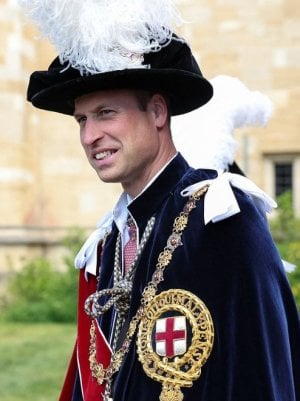Winds of change: Prince William contemplates radical overhaul of British Monarchy
- Replies 45
The British monarchy, an institution steeped in centuries of tradition, is no stranger to change.
However, recent reports suggest that the winds of change are blowing with unprecedented force, as Prince William, the Prince of Wales, is said to be considering a radical overhaul of the royal family's future.
This news has sent ripples through the corridors of Buckingham Palace and beyond, reaching all the way to our shores here in Australia, where the monarchy still holds a place in our constitutional framework and public interest.
The concept of a ‘slimmed-down’ monarchy isn't entirely new. King Charles III has long been an advocate for a more streamlined royal family, focusing on the core members and reducing the public cost.
However, the departure of Prince Harry and Meghan, the Duke and Duchess of Sussex, to the United States has accelerated this process, leaving Prince William as the sole working royal of his generation among the Queen's grandchildren.

The implications of this are significant. With fewer royals to carry out the thousands of official engagements each year, the burden on the remaining members could be immense.
Yet, Prince William's vision, as reported by friends and royal commentators, suggested he is in ‘full agreement’ with his father's lean approach.
This could mean that in the future, when William ascends the throne, the Royal Family might shrink even further.
The traditional image of the royal family, with its balcony appearances and grand ceremonies, could be set for a transformation.
Prince William was reportedly considering whether his own children, Princess Charlotte and Prince Louis, should even take on full-time royal roles.
‘When the older members of the family retire, [William] won’t be inviting anyone else to become working royals. It remains to be seen if he will even want his two younger children to be working royals,’ a source said.
This is a significant departure from the past, where royal duties were often seen as a birthright and obligation.
The Beast's Tom Sykes supports the idea that the younger Wales children might eventually have ‘jobs’ and ‘lives’.
According to another source, ‘The option isn’t there for George, of course, but the children have been kept at arm’s length from royal life. They are exposed to the minimum possible publicity, and that is a deliberate strategy to let Charlotte and Louis choose their own destiny.’
Prince William's reasoning was said to have been influenced by the turmoil and trauma caused by ‘Megxit’.
‘Although he absolutely puts the blame on Meghan and Harry, he does of course, also appreciate that the whole system, where one of your kids is less important than the other due to an accident of birth, had a massive part to play in what happened and how it happened,’ a friend told Sykes.
‘[The Prince of Wales] doesn’t want to put them through a human mincer that is going to cause everyone misery. He and Catherine adore the children, and their whole lives are about the children. I think they want to find a practical solution to the ‘spare’ problem that has bedevilled the family for generations.’
The ‘spare’ dilemma, as it has been termed, has plagued the royal family for generations. The role of the monarch's second-born has often been fraught with difficulty and dissatisfaction.
History is littered with examples, from Princess Margaret's well-documented struggles to Prince Andrew's recent controversies.
‘I’m sure William and Catherine don’t want history to repeat itself,’ another Royal Family friend told Sykes.
This approach is not without its challenges. Prince George, as the future king, will one day bear the weight of the monarchy on his shoulders.
With a potentially reduced team of working royals, the question arises: How will the institution manage its responsibilities? Will the public accept a monarchy that is less visible and arguably less accessible?
The leaner monarchy might struggle to maintain its workload, which included over 2,000 official engagements last year.
Future palace balcony scenes could be significantly less populated, projecting an image of efficiency but potentially lacking sufficient support.
Princess Anne, in a TV interview, expressed scepticism about the ‘slimmed down’ approach, stating, ‘Well, I think the “slimmed down” was said in a day when there were a few more people around.’
‘It doesn’t sound like a good idea from where I’m standing, I would say. I’m not quite sure what else we can do.’
As Prince William envisions a streamlined future for the monarchy, focusing on a leaner and more efficient royal family, this strategic shift aligns with recent developments within the royal household.
In a significant move that underscores this transformation, King Charles has bestowed exclusive new titles on Prince William and Princess Catherine.
This elevation not only cements their central roles in the monarchy's future but also reflects the evolving dynamics and responsibilities that come with William's planned palace overhaul.
 Do you believe a ‘slimmed-down’ monarchy is the right path forward? How do you think these changes will affect the royal family's connection with Australia? We invite you to share your thoughts on this royal revelation in the comments below.
Do you believe a ‘slimmed-down’ monarchy is the right path forward? How do you think these changes will affect the royal family's connection with Australia? We invite you to share your thoughts on this royal revelation in the comments below.
However, recent reports suggest that the winds of change are blowing with unprecedented force, as Prince William, the Prince of Wales, is said to be considering a radical overhaul of the royal family's future.
This news has sent ripples through the corridors of Buckingham Palace and beyond, reaching all the way to our shores here in Australia, where the monarchy still holds a place in our constitutional framework and public interest.
The concept of a ‘slimmed-down’ monarchy isn't entirely new. King Charles III has long been an advocate for a more streamlined royal family, focusing on the core members and reducing the public cost.
However, the departure of Prince Harry and Meghan, the Duke and Duchess of Sussex, to the United States has accelerated this process, leaving Prince William as the sole working royal of his generation among the Queen's grandchildren.

Prince William was reportedly considering a major shift towards a more streamlined monarchy. Credit: Instagram / The Prince and Princess of Wales
The implications of this are significant. With fewer royals to carry out the thousands of official engagements each year, the burden on the remaining members could be immense.
Yet, Prince William's vision, as reported by friends and royal commentators, suggested he is in ‘full agreement’ with his father's lean approach.
This could mean that in the future, when William ascends the throne, the Royal Family might shrink even further.
The traditional image of the royal family, with its balcony appearances and grand ceremonies, could be set for a transformation.
Prince William was reportedly considering whether his own children, Princess Charlotte and Prince Louis, should even take on full-time royal roles.
‘When the older members of the family retire, [William] won’t be inviting anyone else to become working royals. It remains to be seen if he will even want his two younger children to be working royals,’ a source said.
This is a significant departure from the past, where royal duties were often seen as a birthright and obligation.
The Beast's Tom Sykes supports the idea that the younger Wales children might eventually have ‘jobs’ and ‘lives’.
According to another source, ‘The option isn’t there for George, of course, but the children have been kept at arm’s length from royal life. They are exposed to the minimum possible publicity, and that is a deliberate strategy to let Charlotte and Louis choose their own destiny.’
Prince William's reasoning was said to have been influenced by the turmoil and trauma caused by ‘Megxit’.
‘Although he absolutely puts the blame on Meghan and Harry, he does of course, also appreciate that the whole system, where one of your kids is less important than the other due to an accident of birth, had a massive part to play in what happened and how it happened,’ a friend told Sykes.
‘[The Prince of Wales] doesn’t want to put them through a human mincer that is going to cause everyone misery. He and Catherine adore the children, and their whole lives are about the children. I think they want to find a practical solution to the ‘spare’ problem that has bedevilled the family for generations.’
The ‘spare’ dilemma, as it has been termed, has plagued the royal family for generations. The role of the monarch's second-born has often been fraught with difficulty and dissatisfaction.
History is littered with examples, from Princess Margaret's well-documented struggles to Prince Andrew's recent controversies.
‘I’m sure William and Catherine don’t want history to repeat itself,’ another Royal Family friend told Sykes.
This approach is not without its challenges. Prince George, as the future king, will one day bear the weight of the monarchy on his shoulders.
With a potentially reduced team of working royals, the question arises: How will the institution manage its responsibilities? Will the public accept a monarchy that is less visible and arguably less accessible?
The leaner monarchy might struggle to maintain its workload, which included over 2,000 official engagements last year.
Future palace balcony scenes could be significantly less populated, projecting an image of efficiency but potentially lacking sufficient support.
Princess Anne, in a TV interview, expressed scepticism about the ‘slimmed down’ approach, stating, ‘Well, I think the “slimmed down” was said in a day when there were a few more people around.’
‘It doesn’t sound like a good idea from where I’m standing, I would say. I’m not quite sure what else we can do.’
As Prince William envisions a streamlined future for the monarchy, focusing on a leaner and more efficient royal family, this strategic shift aligns with recent developments within the royal household.
In a significant move that underscores this transformation, King Charles has bestowed exclusive new titles on Prince William and Princess Catherine.
This elevation not only cements their central roles in the monarchy's future but also reflects the evolving dynamics and responsibilities that come with William's planned palace overhaul.
Key Takeaways
- Prince William is contemplating a significant change to the monarchy, focusing on a leaner royal family structure.
- The Prince of Wales was reported to be in agreement with King Charles's vision of a streamlined royal family and is not expected to reverse this approach when he ascends the throne.
- There was reportedly an indication that Prince William and Princess Kate might prefer that their younger children, Princess Charlotte and Prince Louis, not undertake full-time royal duties, allowing them a chance at more normal lives.
- Concerns were raised about the future roles and responsibilities of the working royals, especially considering the large number of engagements the family traditionally fulfils, suggesting challenges for Prince George as the future king.







